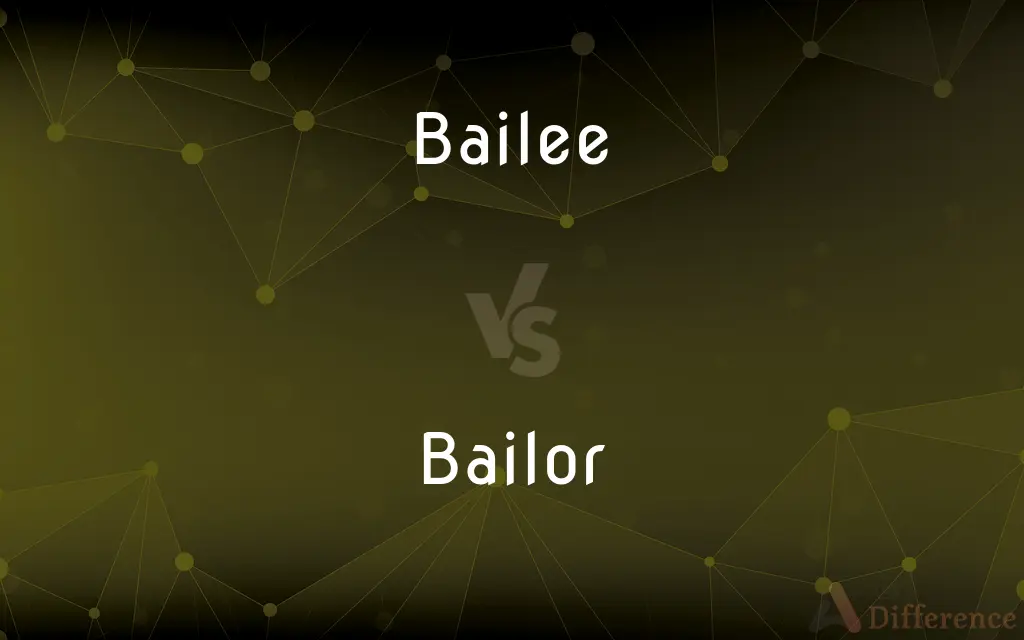Bailee vs. Bailor — What's the Difference?
By Fiza Rafique & Urooj Arif — Updated on March 18, 2024
A bailee receives temporary possession of property, while a bailor owns the property and grants possession to the bailee.

Difference Between Bailee and Bailor
Table of Contents
ADVERTISEMENT
Key Differences
The bailee is an individual or entity that receives property from another for a specific purpose or period, without transferring ownership. Conversely, the bailor is the original owner who temporarily hands over possession of their property to the bailee, often for care, safekeeping, or specific use.
Bailees hold a responsibility to return the property to the bailor after the agreed-upon period or purpose is fulfilled, ensuring the property remains in good condition. On the other hand, bailors must provide the property in a usable condition and may have to disclose any known defects to avoid liability.
In many legal contexts, the bailee is expected to exercise a certain degree of care towards the property, which varies based on the nature of the bailment agreement. Whereas the bailor, by entrusting the property, implies a level of trust and confidence in the bailee's ability to safeguard or use the property appropriately.
Bailee-bailor relationships are common in various scenarios, such as leasing, parking services, or dry cleaning, where property is temporarily entrusted to another party. In these instances, the bailee's role is to perform services or care for the items, while the bailor remains the legal owner throughout the agreement.
The rights and obligations of bailees and bailors are typically defined by the terms of the bailment agreement, which outlines the purpose, duration, and conditions of the temporary transfer. This legal framework ensures both parties understand their roles and responsibilities during the bailment period.
ADVERTISEMENT
Comparison Chart
Definition
Individual/entity receiving temporary possession of property.
Original owner of the property who temporarily transfers possession.
Responsibility
To care for and return the property.
To provide property in usable condition and disclose defects.
Legal Obligation
Exercise care towards the property according to the bailment terms.
Ensure the property is fit for the agreed-upon use.
Typical Scenarios
Leasing, parking services, dry cleaning.
Offering property for temporary use or care.
Relationship to Property
Temporary custodian without ownership rights.
Retains ownership but relinquishes temporary possession.
Compare with Definitions
Bailee
Has custody, not ownership.
A storage facility (bailee) holds items without owning them.
Bailor
Owns and temporarily transfers property.
The car owner (bailor) hands keys to the valet.
Bailee
Bound by the terms of bailment.
A rental shop (bailee) agrees to maintain and return bikes.
Bailor
Relies on bailee's care.
A client (bailor) trusts a coat to a dry cleaner for safekeeping.
Bailee
Responsible for care and return.
The parking valet (bailee) must return cars undamaged.
Bailor
Ensures property is usable.
The tool owner (bailor) provides a working drill for borrowing.
Bailee
Exercises a degree of care.
The jeweler (bailee) repairs a watch while ensuring its safety.
Bailor
Retains legal ownership.
A library (bailor) lends books while maintaining ownership.
Bailee
Receives property temporarily.
A dry cleaner (bailee) takes a suit for cleaning.
Bailor
Discloses known defects.
A homeowner (bailor) warns of a fragile ladder before lending.
Bailee
A person with whom property is left for safekeeping.
Bailor
A person who leaves property with another for safekeeping.
Bailee
(legal) One who holds bailed property; one who takes possession of the property of another (called a bailor) in order to keep that property safe for the other.
Bailor
(legal) One who bails property; one who places property in the hands of another (called a bailee) for safekeeping.
Bailee
A person who is granted bail.
Bailor
One who delivers goods or money to another in trust.
Bailee
The person to whom goods are committed in trust, and who has a temporary possession and a qualified property in them, for the purposes of the trust.
Bailor
The person who delivers personal property (goods or money) in trust to the bailee in a bailment
Bailee
The agent to whom property involved in a bailment is delivered
Common Curiosities
How is a bailee different from a bailor?
The bailee temporarily holds and cares for the property, while the bailor owns the property and grants temporary possession.
Can a bailee become an owner of the property?
No, a bailee does not gain ownership rights over the property; they merely have temporary possession.
What does a bailor do?
A bailor is the original owner who temporarily entrusts their property to a bailee for a specific purpose or time.
Is consent required for bailment?
Yes, both the bailee and the bailor must agree to the terms of the bailment, including the purpose and duration.
What must a bailor provide to a bailee?
A bailor must provide the property in a usable condition and disclose any known defects to avoid liability.
What happens if a bailee damages the property?
The bailee may be liable for damages if they fail to exercise the appropriate degree of care as stipulated in the bailment agreement.
What is a bailee?
A bailee is an individual or entity that receives temporary possession but not ownership of a property from the bailor.
What responsibilities does a bailee have?
A bailee must care for the property and return it in good condition after the bailment period or purpose is completed.
How does the law protect bailees and bailors?
The law outlines the rights and obligations of both parties, often based on the terms of the bailment agreement.
How does insurance play a role in bailment?
Insurance may provide protection for both the bailee and bailor against potential losses or damages to the bailed property.
What types of property can be bailed?
Almost any type of tangible personal property can be subject to bailment, from vehicles to clothing to tools.
Do bailees receive compensation?
In some cases, bailees may receive compensation for their services, especially if the bailment involves a business transaction.
Can a bailment be terminated early?
Depending on the bailment agreement, either party may have the right to terminate the arrangement early under specific conditions.
Can bailment occur without a formal agreement?
Yes, bailment can be implied through actions, even without a written or formal agreement, based on the circumstances of the property transfer.
What is a bailment agreement?
A bailment agreement is a legal document that outlines the terms, conditions, and responsibilities of both the bailee and bailor during the bailment period.
Share Your Discovery

Previous Comparison
Character vs. Conduct
Next Comparison
Sleek vs. SlickAuthor Spotlight
Written by
Fiza RafiqueFiza Rafique is a skilled content writer at AskDifference.com, where she meticulously refines and enhances written pieces. Drawing from her vast editorial expertise, Fiza ensures clarity, accuracy, and precision in every article. Passionate about language, she continually seeks to elevate the quality of content for readers worldwide.
Co-written by
Urooj ArifUrooj is a skilled content writer at Ask Difference, known for her exceptional ability to simplify complex topics into engaging and informative content. With a passion for research and a flair for clear, concise writing, she consistently delivers articles that resonate with our diverse audience.
















































